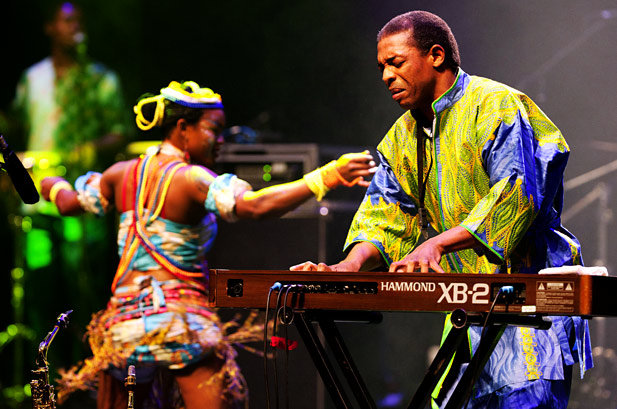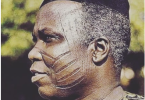Unapologetically loud, African, creative, danceable and standing boldly in defence of social equity and justice, all rolled in one. These are apt words that describe the Afro-centric music genre known as Afrobeat. Afrobeat rode on the waves of European music instrumentation combined with strong elements of African traditional music, to promote African culture and world-view. This article no doubt gives honour to the father and founder of Afrobeat himself – the indefatigable music maestro, late Fela Anikulapo-Kuti.


Femi – Son of Late Fela Anikulapo-Kuti. An Afrobeat Legend
If there is any music genre that has become so infectious and deeply moving, it has to be Afrobeat. Afrobeat effortlessly inspires excitement and dance from its listeners. Its energetic rhythms, harmonious blend of local and foreign instruments, and bold statements touches the very soul. And Afrobeat has been breaking boundaries and exceeding frontiers, uniting people of different backgrounds across the world with energetic, exciting vibes.
Afrobeat – Its Origins
Fela Anikulapo-Kuti, a graduate of London’s Trinity College of Music, was born in October 1938 in Abeokuta, Ogun State of Nigeria. Fela set up the Koola Lobitos band while still in music school; and his favourite instrument was the trumpet. However, he and his pioneer band specialized in a music brand that fused highlife and jazz, at the onset.
Fela returned to Nigeria in 1963, trained as a broadcaster, and briefly played with the renowned Victor Olaiya and the All-Stars band. Fela later regrouped his Koola Lobitos band. He and his band traveled to Los Angeles, and interacted with Sandra Isidore – a member of the Black Panther Party in 1969. That encounter shaped and heavily influenced his world view – solidifying his belief in self-determinism by Africans and their descendants.
He would later rename his band as the Africa ‘70 band. From then on, Fela invented the Afrobeat genre. According to Wikipedia, Fela’s Afrobeat was a combination of ‘fuji music, funk, jazz, highlife, salsa, calypso, and traditional Yoruba music’. And he adopted Pidgin English as his musical language, which attracted many Africans to his music. Pidgin English was far more relatable to many Africans, who had diverse native languages. And a good number of African people were not adept at speaking advanced English. Thus, Pidgin English created a sense of belonging and acceptability for many African music lovers, whether educated or not.
Fela’s belief in African self-determinism spoke loud in his songs, and irritated the Nigerian military leaders of that time. His house and club was attacked, and his mother roughly treated – leading to her demise. However, the shocking experience only further solidified his determination to speak out against social ills and political abuses. It remained so up until he died in 1997. His legacy as a political activist, condemning the ‘slavery mentality’ in Africans through his music has remained ever since.
Key Components of Afrobeat
There are basic components of Afrobeat that are distinctly recognizable. Firstly, the highly danceable and energetic African rhythms are unmistakable. They are created with a mix of African drums, calabash (shekere), triangle and other percussion instruments. Thus creating deeply moving, harmonious and intricate beats that appeal to the senses. Secondly is the infusion of Western wind instruments – trombones, trumpets, and saxophones, which add depth and richness to the tunes. Thirdly, another layer of Western musical instruments, the likes of guitars and keyboards further enrich the Afrobeat blend with exciting sounds.
And finally, the voice connection of the lead singer with the audience or supporting chorus. There is an interaction – a form of call and response, or sing-along, between the lead vocal(s) and the listeners or chorus singers. This interaction is vital, as it brings music listeners closer to the music, enhancing the enjoyment.
Factors Responsible for The Growing Popularity of Afrobeat
- The uncanny adaptability of Afrobeat is legendary. The complex and creative rhythms and styles that can be invented from the basic Afrobeat backbone are unlimited. It has allowed Afrobeat musicians to effortlessly blend it with modern music genres such as pop, hip-hop, reggae, rock, and even other African music styles. By doing so, it has allowed Afrobeat musicians to easily collaborate with other renowned music artists across the world. The results are world-class, exciting songs that have broken boundaries and even sold out on the world stage.
- Afrobeat has produced several interesting African dance styles, which African youths enthusiastically promote on social media. Energetic dance styles such as Shoki, Azonto, Gwara Gwara have emerged from Afrobeat. In fact, dance is not separable by any means from Afrobeat – it is part of the experience. The complex legwork in harmony with the song, which the dance styles exhibit, is so highly stimulating. It has further enticed and attracted many people across the world to Afrobeat.
.
- Afrobeat has reignited the African spirit, and promoted pride in the African identity. Afrobeat is unapologetically an ambassador of African tradition, wisdom and world-view. It has inspired many Africans to embrace and promote the beauty and values of Africa.
.
- Afrobeat has inspired a new generation of music artists – who did not hesitate to take the music beyond Nigerian borders. Armed with social media and music streaming platforms (such as Apple Music, Spotify and Deezer), these artists did not wait for any record label to promote their music. They went ahead to distribute their music to fans worldwide, who sampled and liked their brands of music. And they have been immensely creative and successful with it, everywhere they went.
The likes of Burna Boy, Wizkid, Davido, Ayra Starr, Rema, Tiwa Savage, Yemi Alade, Kizz Daniel, Joeboy and countless other Nigerian artistes. They have taken Nigeria and the rest of the world by storm with their music. All powerfully inspired by a backbone of Afrobeat rhythms, blended with modern music genres, and promoted through the internet. They have become so successful that music labels home and abroad have recognized the fiery acceptance of their music worldwide. Numerous local and international music labels promptly began to sign up and work with these artists. Their huge revenues testify to the popularity and the unmistakably mighty global influence that Afrobeat has acquired for itself so far.
- Afrobeat has also heavily influenced world fashion and art. Modern-day Afrobeat artists not only promoted their music – they boldly practiced their art wrapped in gorgeous African prints. Afrobeat artists further displayed their creativity by wearing an assortment of African fabrics, accessories and creative tailoring styles anywhere possible. Many of them proudly wear African prints and fashion styles to international festivals and events. Batik, Kente, Adire, Ankara, beads, unique African hairstyles and other Pan-African fashion tastes are now popular on the world fashion stage. African-inspired art and fashion are now quite conspicuous in many places around the globe, and continue to spread their influence.






